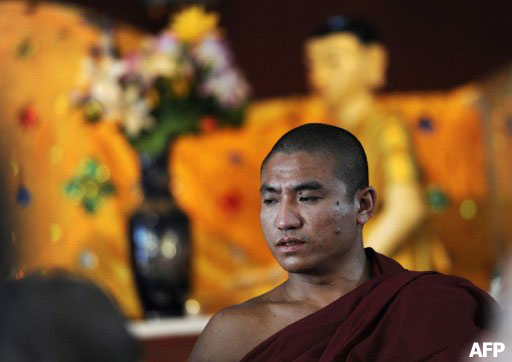Ashin Gambira, one of the leaders of the 2007 “Saffron Revolution,” is again facing criminal charges, following his detention on February 10 and quick release the same day.

The Burmese authorities apparently are filing charges accusing him of illegally "squatting" in Maggin Monastery, which had been closed, and “breaking into” two other monasteries. The authorities closed dozens of monasteries following the 2007 mass uprising, and arrested hundreds of monks after beating them and stripping them of their robes. His detention last week prompted a quick reaction from the U.S. government, which called for his release.
The state-run newspaper, The New Light of Myanmar, said Gambira, 33, was taken before senior monks who “reprimanded” him for his behaviour, Agence France Press reported.
The senior monks pressed "for legal actions" against him after he admonished them in a letter for not helping 43 imprisoned monks, according to the state-run newspaper, which said Gambira had become too political and had repeatedly broken the Buddhist monastic code.
Gambira has challenged the actions of the state sangha authority, the Sangha Nayaka Committee, for not calling for the release of all monks arrested after the 2007 uprising, the state-run newspaper said, saying his comments were "a slap in the face" to the central monks' body.
Reuters news agency reported that state media also accused him of rejoining his religious order without requesting authorization.
Burma observers say the government, despite recent reforms, is still highly sensitive to the role of monks and the media amid the rapid changes taking place in the country, including the return of many exiled Burmese who have been critical of the government and still remain cautious about its commitment to true democracy.
On Saturday, the Voice of America published an editorial titled “Ensuring Due Process In Burma,” in which it said, “We call on the Burmese government to protect the fundamental rights of all of its citizens, including recently released political prisoners,” citing the recent detention of Gambira. The U.S. has encouraged Burma’s recent moves toward democracy while maintaining that it should release all remaining political prisoners and allow them full rights and access to take part in the development of the country.
Gambira has remained outspoken about the sincerity of the recent moves toward democracy, citing continued human rights violations and denial of free speech. A leader of the All-Burmese Monks Alliance, he was serving 68 years in prison before his release in January in an amnesty. He spent many months in solitary confinement.
The officials who detained him on February 10 were from the government religious authority department and Rangoon division government, said AFP.
After he was freed in the amnesty, Gambira had reportedly been trying to reopen monasteries that were closed and locked up by the authorities. Recently, the sangha authorities shut down the Rangoon monastery of a popular abbot, who was viewed as friendly to opposition parties, and evicted him from his monastery.
In many interviews after his release, Gambira said he did not trust the democratic reforms during the past year. When he was arrested in November 2007 after the street protests, he was tried three weeks later and sentenced to 68 years in prison.
He was one of about 600 people freed in January in an amnesty directed toward national reconciliation. Releasing all political prisoners has been a condition for lifting of sanctions imposed by the European Union and the United States.
Sources said that since his release, Gambira had moved in to Meggin Monastery in Rangoon with hopes of rebuilding the monastery that was destroyed by the military regime following the 2007 demonstrations. The monastery’s monks were beaten and many were imprisoned. It is one of more than 60 monasteries that were raided and closed during the crackdown following the protests.
Gambira said in a recent interview that the newly elected government still must apologize to the Buddhist sangha for actions against monks during the mass uprising.
“The government has transformed its external appearance into a civilian one, but their efforts to implement democracy are still rather weak, while many cases of human rights violations continue,” Gambira said.


